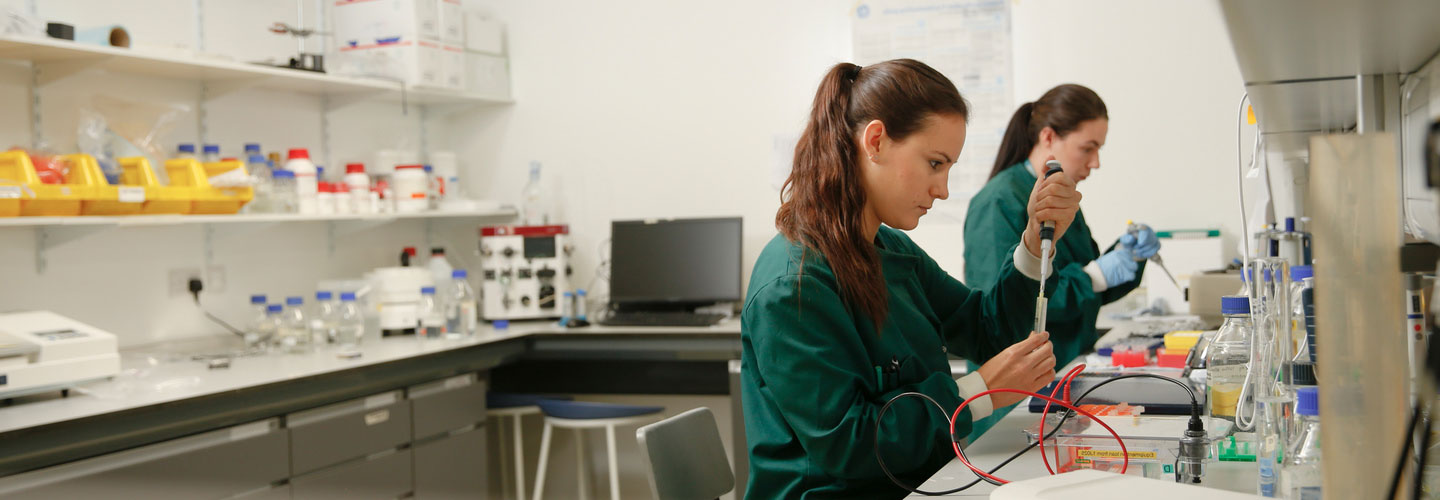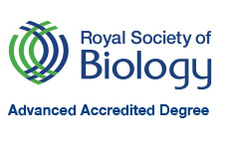Sign up for updates
Interested in studying at the University of Hertfordshire and want to sign up to our mailing list to learn more about our facilities, living in the UK and student life? Use the form below and our team will also keep you informed of key updates such as events near you, applications opening and more!
BSc (Hons) Biochemistry
Key information
-
Typical offer:
Entry requirements -
Fees: See below
Full details -
UCAS code: C1CR
-
Institute code: H36
-
Study abroad option
-
Work placement option
Find out more
Why choose this course?
- Ranked 9th in the UK for health science (Daily Mail University Guide, 2025)
- 1st in the East of England for medical technology and bioengineering (CUG, 2025)
- This course is accredited by the Royal Society of Biology
Ever wonder what is happening inside your cells at the molecular and cellular level? The chemistry behind biological processes? You’ll learn how biochemists use their understanding of biomolecules and cellular pathways to prevent and cure disease, analyse samples, and develop new molecular products. Another part is the application and understanding of techniques, such as sequencing DNA or observing single molecules in action.
Use our strong industry links to get your foot in the door of pharmaceutical, agrochemical or food and drink industries. Build a solid understanding of chemistry from practising scientist. Practise microbiological techniques and blood analysis in a newly built laboratory space. You will also have exclusive access to computer labs with specific software and databases.
While you’ll be exploring many new areas in this degree, we’ll guide you along the way. Lecturers are always happy to help and your personal tutor will guide you to gain general skills in scientific writing, data interpretation and communication. Workshops will take place to practice lecture material and discuss problems with your peers.
Find out more about our teaching staff across the biosciences
Get in touch
Follow us on twitter: @UH_AskBIO
Email: askbio@herts.ac.uk
What's the course about?
Essentially, as a biochemist, you study the fundamental processes of life. You’ll merge scientific techniques from chemistry and biology to seek answers to questions about life, health, disease, the natural environment, materials, and compounds. You’ll study the science behind living cells, tissues, organs and organisms. You’ll learn the biochemical processes that underpin the very latest discoveries. Explore how biochemistry affects the quality of people’s lives. You’ll look at the creation of new drugs and understand processes ranging from the design of medical treatments to the manufacture of new biomaterials.
In your first year, you will study with other bioscience students together to obtain an initial grounding in chemistry, molecular biology and genetics, cell and microbiology and human physiology with pharmacology. At the same time all bioscience students will study biochemistry with you together. You will use your theory to build on your practical skills in a well-equipped, modern laboratory.
In your second year, you will delve even deeper into these topic areas, in addition to further chemistry and biochemistry topics.
Work placement/study abroad option: Between your second and final year, you’ll have the option to study abroad or do a work placement for up to a year. Not only will this give you an amazing experience to talk about but will also give your CV a boost. If you’d rather go straight to your final year, that’s absolutely fine too.
In your final year, you’ll learn about topics such as molecular medicine, cellular development, and off course advanced biochemistry. If you find that you have grown to love a certain topic you can choose to do your major research project in this area.
This programme has been accredited by the Royal Society of Biology.
On average, you have 20 hours of contact time per week, with lectures and workshops taking up about 6-10 hours per week, while the remaining time is devoted to practical work.
Throughout your degree, you will be assessed in a variety of ways. This will include exams, literature reviews, portfolios, lab reports, practicals and presentations. Coursework assessments are generally 50-100% per module.
Your main campus is College Lane
This is where the creative arts, science and health-related subjects are based. This means you’ll share the campus with future nurses, scientists, artists and more. You can use the common rooms to relax with friends, work out in the 24-hour gym or have a drink in our on-campus pub or cafes. We also have restaurants for you to eat in or grab something on the go. Our Learning Resources Centres are open 24/7, which means you can study whenever suits you best. Want to pop over to the other campus? You can take the free shuttle bus or walk there in just 15 minutes.
What will I study?
Degree programmes are structured into levels, 4, 5 and 6. These correspond to your first, second and third/final year of study. Below you can see what modules you’ll be studying in each.


